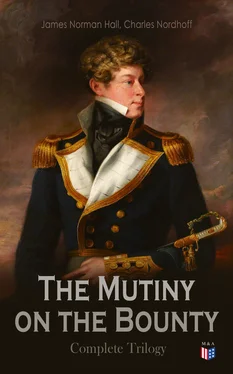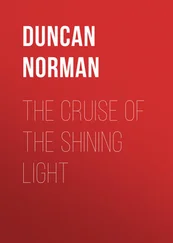There was a fine show of plate on the captain’s table, but when the dishes were uncovered I saw that Bligh fared little better than his men. We had salt beef, in plenty for once, and the pick of the cask, bad butter, and worse cheese, from which the long red worms had been hand-picked, a supply of salted cabbage, believed to prevent scurvy, and a dish heaped with the mashed pease seamen call “dog’s body.”
Mr. Bligh, though temperate in the use of wine, attacked his food with more relish than most officers would care to display. Fryer was a rough, honest old seaman, but his manners at table put the captain’s to shame; yet Christian, who had been a mere master’s mate only a few days before, supped fastidiously despite the coarseness of the food. Christian was on the captain’s right, Fryer on his left, and I sat opposite, facing him. The talk had turned to the members of the Bounty’s company.
“Damn them!” said Bligh, his mouth full of beef and pease, which he continued to chew rapidly as he spoke. “A lazy, incompetent lot of scoundrels! God knows a captain has trials enough without being cursed with such a crew! The dregs of the public houses....” He swallowed violently and filled his mouth once more. “That fellow I had flogged yesterday; what was his name, Mr. Fryer?”
“Burkitt,” replied the master, a little red in the face.
“Yes, Burkitt, the insolent hound! And they’re all as bad. I’m damned if they know a sheet from a tack!”
“I venture to differ with you, sir,” said the master. “I should call Smith, Quintal, and McCoy first-class seamen, and even Burkitt, though he was in the wrong....”
“The insolent hound!” repeated Bligh violently, interrupting the master. “At the slightest report of misconduct, I shall have him seized up again. Next time it will be four dozen, instead of two!”
Christian caught my eye as the captain spoke. “If I may express an opinion, Mr. Bligh,” he said quietly, “Burkitt’s nature is one to tame with kindness rather than with blows.”
Bligh’s short, harsh laugh rang out grimly. “La-di-da, Mr. Christian! On my word, you should apply for a place as master in a young ladies’ seminary! Kindness, indeed! Well, I’m damned!” He took up a glass of the reeking ship’s water, rinsing his mouth preparatory to an attack on the sourcrout. “A fine captain you’ll make if you don’t heave overboard such ridiculous notions. Kindness! Our seamen understand kindness as well as they understand Greek! Fear is what they do understand! Without that, mutiny and piracy would be rife on the high seas!”
“Aye,” admitted Fryer, as if regretfully. “There is some truth in that.”
Christian shook his head. “I cannot agree,” he said courteously. “Our seamen do not differ from other Englishmen. Some must be ruled by fear, it is true, but there are others, and finer men, who will follow a kind, just, and fearless officer to the death.”
“Have we any such paragons on board?” asked the captain sneeringly.
“In my opinion, sir,” said Christian, speaking in his light and courteous manner, “we have, and not a few.”
“Now, by God! Name one!”
“Mr. Purcell, the carpenter. He....”
This time Bligh laughed long and loud. “Damme!” he exclaimed, “you’re a fine judge of men! That stubborn, thick-headed old rogue! Kindness.... Ah, that’s too good!”
Christian flushed, controlling his hot temper with an effort. “You won’t have the carpenter, I see,” he said lightly: “then may I suggest Morrison, sir?”
“Suggest to your heart’s content,” answered Bligh scornfully. “Morrison? The gentlemanly boatswain’s mate? The sheep masquerading as a wolf? Kindness? Morrison’s too damned kind now!”
“But a fine seaman, sir,” put in Fryer gruffly; “he has been a midshipman, and is a gentleman born.”
“I know, I know!” said Bligh in his most offensive way, “and no higher in my estimation for all that.” He turned to me, with what he meant to be a courteous smile. “Saving your presence, Mr. Byam, damn all midshipmen, I say! There could be no worse schools than the berth for the making of sea officers!” He turned to Christian once more, and his manner changed to an unpleasant truculence.
“As for Morrison, let him take care! I’ve my eye on him, for I can see that he spares the cat. A boatswain’s mate who was not a gentleman would have had half the hide off Burkitt’s back. Let him take care, I say! Let him lay on when I give the word or, by God, I have him seized up for a lesson from the boatswain himself!”
I perceived, as the meal went on, that the captain’s mess was anything but a congenial one. Fryer disliked the captain, and had not forgotten the incident of the cheeses. Bligh made no secret of his dislike for the master, whom he often upbraided before the men on deck; and he felt for Christian a contempt he was at no pains to conceal.
I was not surprised, a few days later, to learn from Old Bacchus that Christian and the master had quitted the captain’s mess, leaving Bligh to dine and sup alone. We were south of the line by this time.
At Teneriffe, we had taken on board a large supply of pumpkins, which now began to show symptoms of spoiling under the equatorial sun. As most of them were too large for the use of Bligh’s table, Samuel was ordered to issue them to the men in lieu of bread. The rate of exchange—one pound of pumpkin to replace two pounds of bread—was considered unfair by the men, and when Bligh was informed of this he came on deck in a passion and called all hands. Samuel was then ordered to summon the first man of every mess.
“Now,” exclaimed Bligh violently, “let me see who will dare to refuse the pumpkins, or anything else I order to be served. You insolent rascals! By God! I’ll make you eat grass before I’ve done with you!”
Everyone now took the pumpkins, not excepting the officers, though the amount was so scanty that it was usually thrown together by the men, the cooks of the different messes drawing lots for the whole. There was some murmuring, particularly among the officers, but the grievance might have ended there had not all hands begun to believe that the casks of beef and pork were short of their weight. This had been suspected for some time, as Samuel could never be prevailed on to weigh the meat when opened, and at last the shortage became so obvious that the people applied to the master, begging that he would examine into the affair and procure them redress. Bligh ordered all hands aft at once.
“So you’ve complained to Mr. Fryer, eh?” he said, shortly and harshly. “You’re not content! Let me tell you, by God, that you’d better make up your minds to be content! Everything that Mr. Samuel does is done by my orders, do you understand? My orders! Waste no more time in complaints, for you will get no redress! I am the only judge of what is right and wrong. Damn your eyes! I’m tired of you and your complaints! The first man to complain from now on will be seized up and flogged.”
Perceiving that no redress was to be hoped for before the end of the voyage, the men resolved to bear their sufferings with patience, and neither murmured nor complained from that time. But the officers, though they dared make no open complaints, were less easily satisfied and murmured frequently among themselves of their continual state of hunger, which they thought was due to the fact that the captain and his clerk had profited by the victualing of the ship. Our allowance of food was so scanty that the men quarreled fiercely over the division of it in the galley, and when several men had been hurt it became necessary for the master’s mate of the watch to superintend the division of the food.
About a hundred leagues off the coast of Brazil, the wind chopped around to north and northwest, and I realized that we had reached the southern limit of the southeast trades. It was here, in the region of variable westerlies, that the Bounty was becalmed for a day or two, and the people employed themselves in fishing, each mess risking a part of its small allowance of salt pork in hopes of catching one of the sharks that swam about the ship.
Читать дальше











